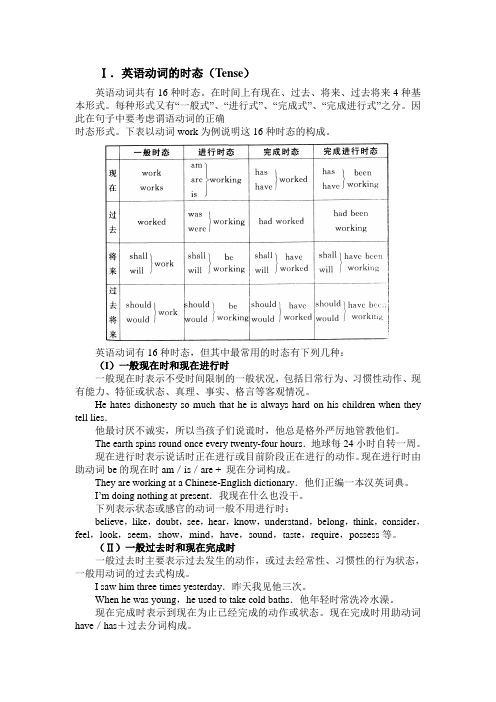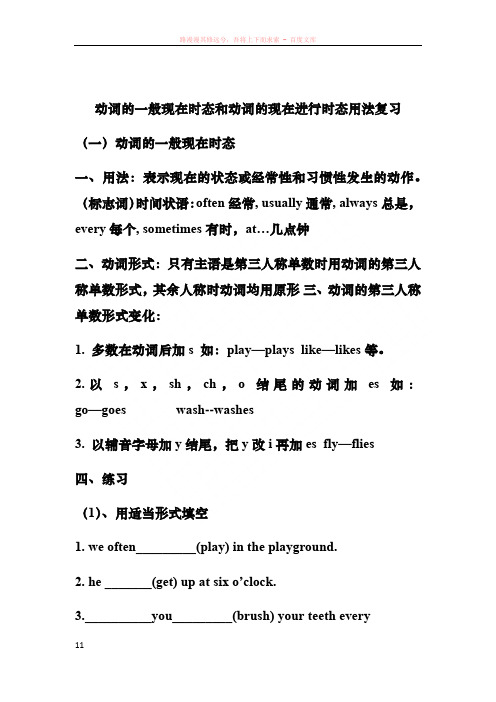动词时态复习(各种时态)
【高三一轮复习语法】动词的时态与语态(共28张ppt)

②在条件状语从句和时间状语从句中用一般现在时表将来(主将从现)。 If you leave tomorrow , I'll see you at the airport. 如果你明天走,我到机场送你。 When she comes, I'll tell her about it. 她来时我将把这件事告诉她。 (2)现在进行时表将来 现在进行时表示将来,往往是指计划好或准备要做的事。一些表示动作 转换的动词,如go, come, leave, start, begin,stay,take off,arrive等,或 者也称为位移性动词,其进行时表示马上要做某事。
• He used to get up early . 过去他总是早起。(现在不这样了) • He will be used to getting up early . 他将会习惯早起。 • Wood is used to make paper. 木材被用来造纸。
(三)一般将来时
1、表示将要发生的动作或存在的状态,常用的时间状语有later(on), soon, in a month, next time, from now on, tomorrow等。 I shall be eighteen years old next year. 明年我就十八岁了。 2、一般将来时的其它表示形式 (1)一般现在时表将来 ①按照计划或时刻表要发生的事情。 The new library opens next month. 新图书馆下月开放。 The plane takes off at 3:00 P.m. 飞机于下午三点起飞。
We are about to discuss this problem.我们将马上讨论这个问题。 They were about to leave when the telephone rang. 他们正要离开时电 话响了。
八大时态讲解(共26张PPT)

0 一般过去将来时:
He was sixty-eight. In two years he would be seventy.
I knew you would agree.
0 现在英进行语时的: 动词时态(进行) What are you doing?
算;
如:I am going to listen to music. (我打算听音乐) will /shall 表示未事先思考或为计划过的意图
如:It will be Christmas soon .(很快就圣诞节了)
4. 现在进行时态( The Present Continuous Tense )
5、我们离开广州六年了。
We have left Guangzhou for 6 years . ×
We have been away from Guangzhou for 6
years .
3.常见句型
1) 主句(现在完成时)+since 从句(一般过去时).
2) It is +一段时间+ since 从句(一般过去时).
has gone to
He said had seen this morning, …ago, etc
that he _________the film many 如果明天不下雨,我们将去野营。
He has borrowed the pen for three days .
times. 现在进行时态( The Present Continuous Tense )
was /were going to +动词原形
(完整版)小学动词进行时态归纳

(完整版)小学动词进行时态归纳1. 动词进行时态概述动词进行时态是指表示现在进行中的动作或状态的时态。
在英语中,使用“be”动词加上动词的ing形式来构成进行时态。
动词进行时态主要有三种形式:现在进行时、过去进行时和将来进行时。
2. 现在进行时现在进行时表示现在正在进行的动作或状态。
构成现在进行时的公式为:“主语 + be动词(am/is/are) + 动词的ing形式”。
例如:- They are playing basketball.(他们正在打篮球。
)- She is reading a book.(她正在读书。
)现在进行时的用法:- 表示现在的动作或状态。
例:I am cooking dinner.(我正在做晚饭。
)- 表示计划或安排的动作。
例:She is meeting her friends tomorrow.(她明天要和朋友们见面。
)- 表示逐渐发生的动作。
例:The weather is getting warmer.(天气正在变暖。
)3. 过去进行时过去进行时表示过去某一时间正在进行的动作或状态。
构成过去进行时的公式为:“主语 + was/were + 动词的ing形式”。
例如:- They were playing football yesterday.(他们昨天正在踢足球。
)- She was studying at the library.(她那时正在图书馆研究。
)过去进行时的用法:- 表示过去某时正在进行的动作。
例:I was watching TV when she called.(她打电话的时候我正在看电视。
)- 表示过去某一段时间内持续进行的动作。
例:They were studying for hours last night.(昨晚他们研究了几个小时。
)4. 将来进行时将来进行时表示将来某一时间正在进行的动作或状态。
构成将来进行时的公式为:“主语 + will be + 动词的ing形式”。
初中英语中考复习时态讲解课件(共79张ppt)

一般现在时
1. 表示经常性或习惯性的动作
She does excersice everyday.
真题链接
—What do you often do at weekends?
—I often ____ my grandparents.
A. visit
B. visited
C. have visited D. will visit
Just a moment, I am washing dishes.
when
习题
Just a minute! My brother________ his car in the garden. A. washes B. is washing C. washed D. will wash
习题
---Hey, Tom. Let’s go swimming.
动词过去分词 不规则变化
speak hear see give build swim buy teach
spoken heard seen given built swum bought taught
现在完成时
already yet
1.过去发生或已完成的某一动作对现在的影响。
I have already watched this film. I haven't watched this film yet. I have already visited America. I haven't visited America yet.
A. prepares
B. is preparing
C. has prepared D. prepared
真题链接
--Mum, it's late. Why are you still here? --Dad hasn't come back yet. I ____ for him. A. am waitingB. was waiting C. waited D. had waited
动词时态总结

Ⅰ.英语动词的时态(Tense)英语动词共有16种时态。
在时间上有现在、过去、将来、过去将来4种基本形式。
每种形式又有“一般式”、“进行式”、“完成式”、“完成进行式”之分。
因此在句子中要考虑谓语动词的正确时态形式。
下表以动词work为例说明这16种时态的构成。
英语动词有16种时态,但其中最常用的时态有下列几种:(I)一般现在时和现在进行时一般现在时表示不受时间限制的一般状况,包括日常行为、习惯性动作、现有能力、特征或状态、真理、事实、格言等客观情况。
He hates dishonesty so much that he is always hard on his children when they tell lies.他最讨厌不诚实,所以当孩子们说谎时,他总是格外严厉地管教他们。
The earth spins round once every twenty-four hours.地球每24小时自转一周。
现在进行时表示说话时正在进行或目前阶段正在进行的动作。
现在进行时由助动词be的现在时am/is/are + 现在分词构成。
They are working at a Chinese-English dictionary.他们正编一本汉英词典。
I’m doing nothing at present.我现在什么也没干。
下列表示状态或感官的动词一般不用进行时:believe,like,doubt,see,hear,know,understand,belong,think,consider,feel,look,seem,show,mind,have,sound,taste,require,possess等。
(Ⅱ)一般过去时和现在完成时一般过去时主要表示过去发生的动作,或过去经常性、习惯性的行为状态,一般用动词的过去式构成。
I saw him three times yesterday.昨天我见他三次。
动词的一般现在时态和动词的现在进行时态

动词的一般现在时态和动词的现在进行时态用法复习(一)动词的一般现在时态一、用法:表示现在的状态或经常性和习惯性发生的动作。
(标志词)时间状语:often经常,usually通常,always总是,every每个,sometimes有时,at…几点钟二、动词形式:只有主语是第三人称单数时用动词的第三人称单数形式,其余人称时动词均用原形三、动词的第三人称单数形式变化:1. 多数在动词后加s如:play—plays like—likes等。
2.以s,x,sh,ch,o结尾的动词加es如:go—goes wash--washes3. 以辅音字母加y结尾,把y改i再加es fly—flies四、练习(1)、用适当形式填空1.we often_________(play)in the playground.2.he_______(get)up at six o’clock.3.__________you_________(brush)your teeth everymorning?4.what(do)he usually(do)after school?5.nick_______(not go)to the zoo on Sunday.6. she_______(go)to school from Monday to Friday.7.at eight at night,she__________(watch)TV with his parents.8. ________mike________(read)English every day?2、写出下列动词的第三人称单数drink______go_____stay_____make______look____ have_____pass____carry____come_______watch_____ plant_______fly________study_______brush________do_________teach_______(二)动词的现在进行时态一、定义:现在进行时表示现在或当前一般时间正在进行的动作。
2023年中考英语专题精品课件--动词的时态课件
A. discuss
B. discussed
C. will discuss
12. Volunteers __C___ books and toys to some village schools next Monday.
A. send
B. sent
C. will send
13. —Bob, have you finished reading the book? 时态看问句
一般现在时表示将来 表示按规定或时间表预计将发生的动作 主将从现,用在以if、as soon as、until、when oon; next week/month...(next系列); in a week、in 2024、in+一段时间; one day、in the (near) future等
一般过去时与过去进行时
过去进行时--构成 主语+was/were +动词现在分词+其他 过去进行时--用法 表示过去某一时刻正在进行或发生的动作 表示过去某一时间段内正在进行或发生的动作 在含有时间状语从句的复合句中,延续时间较长的动作用过去进行时, 另一个短暂性动作用一般过去时 表示两个延续性动作在过去某一时刻同时进行时,不考虑动作的先后顺 序,主句和从句的谓语动词都用过去进行时,连词常用while
A. am talking
B. was talking
C. were talking
4. —Is this your camera?
—Yes, I ___C_____ it for two weeks. 现在完成时
A. bought
B. had
C. have had
5. As soon as she ___A__ in Nanning, she will call you.
专题10 动词的时态和语态(课件)-2024年中考英语复习(全国通用)
14.(2022·湖北武汉·统考中考真题)—I don’t think sixteen-year-olds should be allowed
to drive. —I ________. It’s not safe. A.agree B.agreed C.will agree
D.had agreed
apples in the fridge now.
A.is
B.are
C.was
D.were
【答案】A 【解析】句意:现在冰箱里有一些果汁和几个苹果。考查一般现在时及 “there be”。根据“now”,排除过去时态的CD,由于there be的就近原则, some juice不可数,所以应是is。故选A。
5.(2023·甘肃白银·校考一模)Thanks to those cleaners who ________ hard on the streets, we can have a beautiful city. A.work B.worked C.have worked D.were working
真理。
时态的辨析 满分秘籍
易失分点
提分特训
时态 谓语动词
意义
例句
一般
表示过去
过去 was/were,did 的动作或
时
状态。
When he was a child, he often swam in the river.当他小的时候,他经常在河里游泳。
16.(2023·江苏南通·统考一模)—What will the weather be like tomorrow? —I was on the phone and ________ most of the weather report. A.have missed B.was missing C.will miss D.missed
时态复习Tense of Verbs
标志语:tomorrow,the day after tomorrow, in.. ,next…
Ex1. 写出下列词的单三形式:
look; go; give; fly; have
looks;
goes; gives;
flies;
has
EX2 1.Tom often___( get ) up at six in the morning 2. The earth __( go) around the sun . 3.Mary’s parents__(live ) in Beijing .
标志语: Look! 、 Listen! 、now 有时必须根据上下文语境来判定:
--Where is Lucy ?
--Lucy is’nt here,I think she is cleaning in the classroom.
动词-ing形式的构成:
一般在动词原形后 +ing go——going ask——asking 以不发音的e结尾的, write——writing 去e,+ing take——taking make——making 重读闭音节以一个辅 get——getting 音字母结尾的,双写 run——running swim——swimming 这一字母+ing
动词时态 Tense of Verbs
四种类型
结构(以do为例) 例句
一般现在 do (does) 时
现在进行 be (am, is, are) + 时 doing 一般过去 did 时
I always go to the park! 我总是去公园. She is going to school now. 她现在正去学校.
时态复习精讲(一般现在时、现在进行时、将来时、过去式)
过去进行时
昨晚八点钟他在做作业。 (He was doing homework at 8 o'clock last night.)
一般将来时
明天下午我将有空。 (I will be free tomorrow afternoon.)
将来进行时
后天上午他们将在办公室工作。 (They will be working in the office the next morning.)
"be+动词-ing形式"
表示将来某个时间正在进行的动作,例如"She is coming to visit us next month."。
注意事项与常见错误
注意时态一致性:在复合句中,主句和从句的时态应 保持一致,不要混淆时态。
区分"will/shall"与"be going to"的用法:虽然两者 都可用于表示将来时,但"will/shall"强调的是意愿或 可能性,而"be going to"强调的是计划或预测。
常见句型结构
"will/shall+动词原形"
表示将来某个时间发生的动作或存在的状态,例如"I will go to the party tomorrow."。
"be going to+动词原形"
表示计划或预测将来发生的动作,例如"We are going to meet at the park next week."。
注意事项与常见错误
动词ing形式的正确使用
注意动词ing形式的拼写和语法,如 “running”而不是“runing”。
- 1、下载文档前请自行甄别文档内容的完整性,平台不提供额外的编辑、内容补充、找答案等附加服务。
- 2、"仅部分预览"的文档,不可在线预览部分如存在完整性等问题,可反馈申请退款(可完整预览的文档不适用该条件!)。
- 3、如文档侵犯您的权益,请联系客服反馈,我们会尽快为您处理(人工客服工作时间:9:00-18:30)。
动词时态复习(各种时态)初中英语动词时态复习讲义一般现在时一、动词的第三人称词尾变化:当主语是第三人称单数时,谓语动词需加-s或-es:%注意:动词have的第三人称单数是has.写出下列动词的单数第三人称形式。
1. cook enjoy ______7. go _________8 receive ______9 cry______10. close ________11. drive _______ 12. choose ______13. play ________14. reach ________二. 一般现在时的用法1)表示经常的或习惯性的动作,常与表示频度的副词连用。
常用的频度副词有:always、often、usually、seldom、never。
频度副词在句中通常放在行为动词之前,系动词、助动词之后。
例如: He often goes swimming in summer.他夏天经常游泳。
I usually leave home for school at 7 every morning. 每天早上我七点离开家。
2)表示现在的状态。
例如:My father is at is very busy. 我父亲在工作,他很忙。
The boy is twelve. 这男孩十二岁。
3)表示主语具备的性格、特征和能力等。
例如:All my family love football .我全家人都喜欢足球。
My sister is always ready to help others . 我妹妹总是乐于助人。
Ann writes good English but does not speak well. 安英语写得不错,讲的可不行。
4)表示客观真理,客观存在,自然现象。
例如:The earth moves around the sun. 地球绕太阳转动。
:Shanghai lies in the east of China. 上海位于中国东部。
5)表示按计划或安排好的,或将要发生的动作,可用一般现在时表将来。
但只限于start,begin,leave,go,come,arrive,return,take place等。
例如:The train leaves at six tomorrow morning. 火车明天上午六点开。
He comes back tonight. 他今晚回来。
6)在复合句中,当主句是一般将来时,时间或条件状语从句的谓语动词只能用一般现在时来表示将来要发生的动作。
例如: I'll tell him the news when he comes back. 他回来时,我将告诉他这个消息。
If you take the job , they will talk with you in greater details.如果你接受这份工作,他们将和你谈谈细节。
[巩固练习:1、Lucy likes going skating with her friends. (改写成否定句)________________________________________________________2、Aunt Li’s son has ten toy bears. (对划线部分提问)________________________________________________________3、His watch costs 300 yuan. (变成一般疑问句并否定回答)________________________________________________________4、I like being a nurse for the old. (变成一般疑问句)*________________________________________________________5、张叔叔每天乘坐地铁上班。
________________________________________________________6、我们每周日常花三小时在图书馆看书。
________________________________________________________7、我爷爷常常晚饭后出去散步。
________________________________________________________一般过去时-写出下列动词的过去式形式。
1. put ________2. drink _______3. cry _______4. pull ________5. ride ________________7. sit ________8. run _________9. take _________ _______11. stop _______ 12. solve _______13. rob ________14. wait _________15. lie _________ 16. turn _______17. explore _______18. drop _______19. clean ______20. produce _____ "______二. 一般过去时的用法1)表示过去某个时间所发生的动作或存在的状态。
常和表示过去的时间状语yesterday, last week, an hour ago,just now, the other day, in 1982等连用。
在一般过去式中,要表达“过多少时间之后”,一般用after。
几年后。
例如:Where did you go just now 刚才你上哪儿去了After a few years,she started to play the piano.几年后,她开始弹钢琴。
2)表示在过去,经常或反复发生的动作。
常与often,always等表示频度的副词连用。
例如:When I was a child, I often played football in the street.我是个孩子的时候,常在马路上踢足球。
3)一般过去式也可与today,this week,this month,this year等表现在的时间壮语连用,但这些时间壮语须指过去的时间,决不包含“现在”“此时此刻”的意思。
例如:Did you see him today今天你看见他了吗巩固练习:1、Yesterday I went swimming.(改写成否定句。
)________________________________________________________2、He was born in Shanghai.(对划线部分提问)________________________________________________________3我昨天买了一辆新自行车。
________________________________________________________4、我前天读了一本书。
________________________________________________________一般将来时一、一般将来时的构成:助动词will+动词原形在口语中,will在名词或代词后常缩为’ll,wii not常简缩为won’t。
在疑问句中,主语为第一人称时(I和we)时,常用助动词shall。
例如:She’ll go to play basketball. 她要去打篮球。
Shall we go to the zoo 我们要去动物园吗【二、一般将来时的用法1、表示将来某个时间要发生的动作或存在的状态,常与tomorrow, next year等连用。
例如:I'll meet you at the school gate tomorrow morning.2、表示将来经常或反复发生的动作。
例如:I’ll come and see you every Saturday next year.明年我将每个星期六来看你。
3、表示说话人对于将来的看法、假设和推测,通常用be afraid,be/feel sure,hope,know,think 等后面的从句或与副词perhaps,possibly,maybe等连用。
例如:I think she’ll go back home for supper. 我想她会回家吃饭。
Maybe she’ll go to the gym.也许她会去体育馆。
三、be going to +不定式,表示将来。
*1、表示主语进行某一行动的打算意图。
这种打算常经过预先考虑并含有自己做好某些准备的意思。
即计划,安排要发生的事。
例如:What are you going to do tomorrow 明天打算作什么呢The play is going to be produced next month。
这出戏下月开播。
2、表示说话人确信如此或有某种迹象表明某事即将发生。
例如:Look at the dark clouds, there is going to be a storm. 看那乌云,快要下雨了。
3、注意:be going to 和will之间的区别。
○1两者都用于预测时,be going to意指有迹象表明某件事将要发生,属客观的推测;will则意指说话人认为/相信某件事将要发生,属主观的推测。
○2两者在时间的发生上,be going to通常表示马上要发生或相当快就要发生的事情;而will不指明任何具体时间,可以指遥远的未来。
#例如:He is gong in to be better. 他的病就要好起来了。
He will be better. 他的病会好起来了。
○3两者都表示意图时,be going to含有预先计划、准备的意思;will则指未经过预先思考或计划,是临时的一种决定。
○4在条件壮语从句中,be going to表将来,will表意愿。
例如:If you are going to make a journey, you'd better get ready for it as soon as possible.如果你将要去旅行,最好尽快做好准备。
Miss Gao will tell you the answer if you ask her. 如果你去问高老师,她会告诉你答案。
四、be +不定式表将来,表示客观安排或受人指示而将要做某事。
-例如:We are to discuss the report next Saturday.我们下星期六讨论这份报告。
